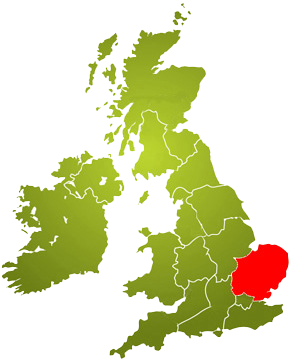
 The East of England region (formerly East Anglia) is typically flat fenland with much of it lying below sea level. The distance between training centres, and the overloaded road network in the region, means that you may be required to spend time travelling between urology units.
The East of England region (formerly East Anglia) is typically flat fenland with much of it lying below sea level. The distance between training centres, and the overloaded road network in the region, means that you may be required to spend time travelling between urology units.
You will, however, be part of an active, committed group of around 25 trainees with National Training Numbers (NTNs), together with a number of academic trainees both at Academic Clinical Fellow (ACF) and Academic Clinical Lecturer (ACL) level.
Email Lara Hemsworth (BSoT rep)
Training Units
| East of England training hospitals: |
- Addenbrooke's Hospital, Cambridge
- Bedford Hospital
- Broomfields Hospital, Chelmsford
- Colchester Hospital
- Ipswich Hospital
- The Queen Elizabeth Hospital, King's Lynn
- Lister Hospital, Stevenage
- Luton & Dunstable Hospital
- Norfolk & Norwich University Hospital
- Peterborough City Hospital
- Princess Alexandra Hospital, Harlow
- Southend University Hospital
- St Bartholomew's Hospital, London
- Watford General Hospital
- West Suffolk Hospital, Bury St Edmunds (use the link below to email the TPD, Georgina Wilson)
Email the Training Programme Director
East of England Deanery website
|
The East of England is a large but friendly region to train in, with a broad range of expertise from which to learn. There is opportunity to train in all urological subspecialties within this one deanery, working at both district general hospitals and tertiary referral centres.
Training Experience
In addition to giving you a broad-based training in general urology, emergency urology and sub-specialty techniques, your trainers will help you to prepare for independent practice as a Consultant Urologist by attending the following courses:
- Urology Boot Camp - ST3 (now mandatory for training in urology)
- A national or international meeting every two years - ST3 to 7
- HEE Leadership & Management - ST3+
- Emergency Urology Course - ST4 or 5
- British Association of Paediatric Urologists (BAPU) Course - ST4 or 5
- FRCS Urol Revision Course - ST6
- Leadership & Management Course - ST6 or 7
You'll be able to have an important say in where you work each year, and it is rare for trainees not to get their "first choice" placement after the ST3 entry year.
In the last two years of your training, you will probably opt to go to one of the two tertiary referral hospitals in the region (Addenbrooke's or Norfolk & Norwich). Both offer excellent high-level training, and mini-rotations through different sub-specialist interests within the same department.

Teaching Programme
Training days are held on a monthly basis and are highly interactive. In 2018, the incumbent Training Programme Director (TPD) Oliver Wiseman was awarded the Silver Cystoscope for excellence in training.
Special mention must be made of "Norwich Week". This is an entire week of teaching that takes place every January, organised by Sarah Wood and Ruth Doherty in Norwich.
Suzanne Biers, from Addenbrooke's, arranges sub-specialist training in the form of days out of the hospital to attend conferences, and runs a teaching day on emergency urology for trainees.
You will also be encouraged to attend the East Anglian Urologists' (EAU) meeting using the klink below The meeting, which includes the Patrick Doyle Trainees' Prize (for audit-led or research-based papers) & the Michael Handley Ashken Memorial Lecture & Dinner (given by an invited speaker using a generous endowment from the Ashken family) takes place annually.
More about the East Anglian Urologists' (EAU) meeting
Research and Audit
There are considerable research opportunities available in both Cambridge and Norwich.
By working alongside academic trainees, you will get the opportunity to be take part in high-level research and academic teaching that would be available in few other places. If you attend any international urology conference, you'll see some of the ground-breaking research work coming out of the region.
More about Cambridge urology research

The Bottom Line
Most trainees choose to make their home in Cambridge or in the surrounding area. The prime advantage of this is that Cambridge is centrally located within the region, picturesque and only 50 minutes from London King's Cross by train. Travelling between units, therefore, is relatively simple.
Some trainees have, in fact, continued to live in London and commute to the more southerly located hospitals; one trainee has even commuted from the North East region!
The East of England may not be able to offer the range of theatres, night clubs or retail therapy that you would find in the middle of a major city. However, for the things that really matter - excellent training & opportunities, friendly & supportive trainers, attractive countryside, nice people and a great place to have a young family - you will find it difficult to beat. Oh ... and it's also the driest region of the UK !
Contacts & admin info for East of England